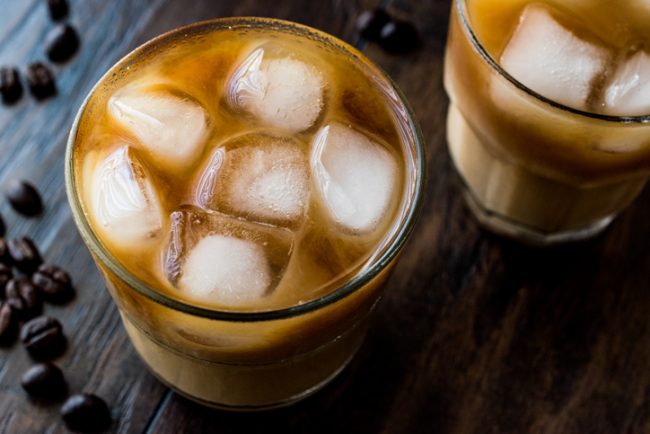Grabbing a hot cup of joe is a tried-and-true way to jumpstart yourself. Or you could drink iced coffee for a little zing, especially during the dog days of summer.
Another option? Cold-brew coffee, created by slowly soaking grounds in cold or room-temperature water, usually for eight to 24 hours. Time, not heat, works to extract compounds.
Cold brew gained the limelight in the past decade, according to major news outlets. But it’s likely at least a couple hundred years old, according to Daily Coffee News, the online arm of Roast Magazine, an industry trade publication.
Genesis aside, cold-brew fans can’t keep a lid on their love for the stuff. Here are the pros of cold brew—according to proponents:
It’s less acidic
First, keep in mind that cold-brew processes vary as far as steeping time, roast of coffee, how course grounds are, water temperature and ratio of water to grounds. That means each batch of cold brew is going to vary too—in acidity and other characteristics (see taste and caffeine, below).
That said, an often-cited study commissioned by Toddy, a forerunner in making cold-brewing systems, found cold-brew coffee to be 67 percent less acidic than hot brew. This could be because without high water temperatures, beans’ oils, which have acidic compounds, don’t dissolve and release easily.
Toddy declined to share its study, noting that it’s proprietary. But “it was conducted by an independent third-party laboratory,” says Toddy Support Lead Devon Powers, who deals with all product questions.
Lower acidity—in general—is easier on your stomach and teeth. Toddy steers clear of claims to that end though.
“We would decline to provide any specifics on health benefits,” Powers says. “The research we have conducted has been into the quality of cold brew and the food-safety standards in its production and storage.”
It tastes smoother
This much is true: Hot water forces chemical reactions in the coffee grounds, per our acid-chat above. Less acid means less bitterness.
Those reactions also help create the coffee’s signature aroma—and how things smell plays a huge role in how thing tastes. So right off the bat, no heat means a milder scent, which leads to milder taste.
Cold water, on the other hand, takes its sweet time extracting flavor, creating a mellower and smoother flavor.
Still, if your cold brew steeps longer than 24 hours, it’s possible to get the bitterness of hot-brew methods, according to Berkeley Wellness.
So if you dig coffee’s bite and don’t steep your grounds for very long, you might be disappointed by cold brew. But if you look at cold brew as something different, you’ll have a new world to enjoy.
It has less caffeine—or is it more?
Cold-brew fans are on both sides of this argument.
Toddy claims to brew up to two-thirds less caffeine than regular coffee. Others say cold brew has more caffeine.
Why care about caffeine levels? Too much of it can lead to osteoporosis or fibrocystic disease, according to the National Institutes of Health.
How much caffeine gets extracted from coffee beans, cold- or hot-brewed, depends on the factors mentioned above and more, so given that, it’s hard to make blanket statements on this front.
As you’ve probably guessed, there’s not much research on cold-brew coffee. But we know a few things about coffee in general.
Drinking moderate amounts could reduce your risk of getting Parkinson’s disease, type 2 diabetes or liver disease, recent studies suggest.
Still, coffee has a mind-boggling number of naturally occurring chemicals, not all of which have been identified and some of which could be harmful. Plus, studies have been observational, which means they compare coffee drinkers with non-drinkers, so little can be said about cause and effect, note U.C. Berkeley and Harvard University’s schools of public health.
All told, if java is your thing for feeling perky and happy (coffee drinking over a long period also might help ward off depression), feel free to stick with it—brewed hot or cold.
Cold brew just got colder! If you’re looking for more ways to enjoy this chilly java, try our cold-brew mocha coconut ice pops recipe.
Learn more about journalist and wellness writer Mitra Malek at mitramalek.com.

